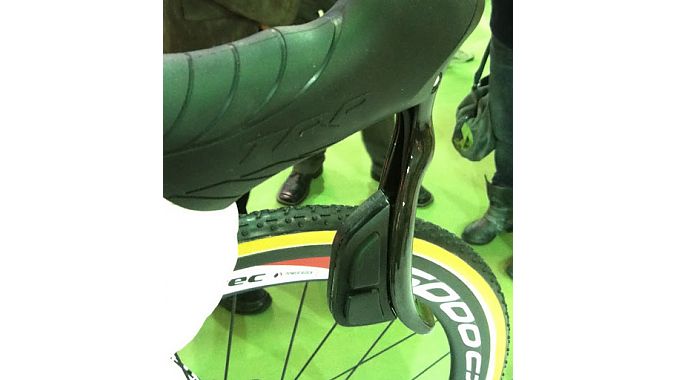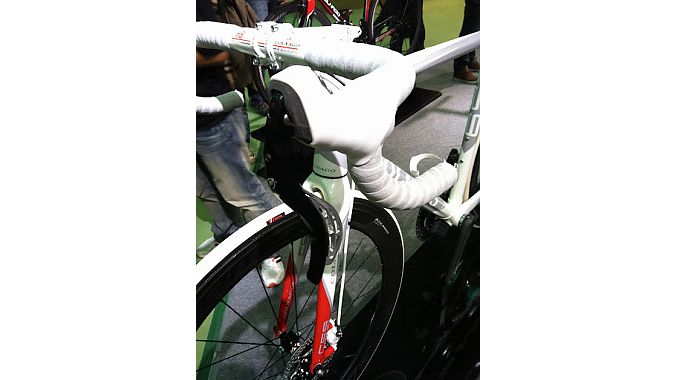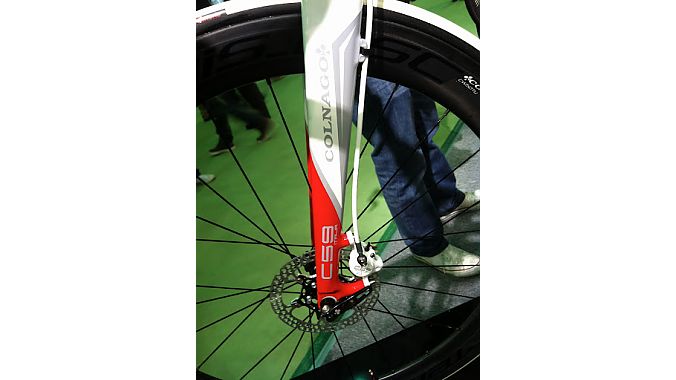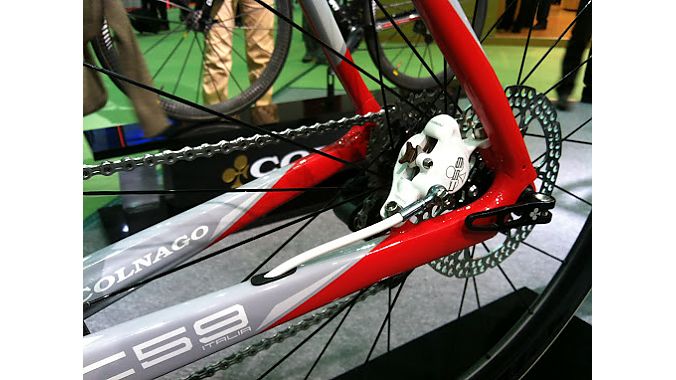TAIPEI, Taiwan (BRAIN)—TRP and Formula are each showing early versions of hydraulic disc brake road bike levers with integrated Shimano Di2 shifting.
TRP says its Hywire shifters will be available this summer. Their system has two buttons mounted at the bottom of carbon brake levers; the front and rear brake calipers are optimized for each position. The company did not have a weight available, but said they will cost manufacturers about $190 a set (that translates into roughly $475 on the retail sales floor).
The company had the system mounted on a Stevens cyclocross bike, but TRP's Tina Ou said the system is more likely to end up on high end road bikes. She said TRP's Paradox, which converts a cable lever to work with hydraulic calipers, is more likely to be popular with cyclocrossers, because it's less expensive.
Ou also said TRP does not yet have a hydraulic rim brake for the road, but hinted the company is working on one.
Meanwhile, Formula showed off a Colnago road bike in its booth (there was also one in the Colnago booth) with its new levers. They are similar in concept to TRP's, but instead of buttons, Formula uses two aluminum levers behind the brake lever.
Formula's Giancarlo Vezzoli said the Formula system — levers, hosing, caliper, rotor and other hardware — is 10 grams lighter than the comparable Dura-Ace Di2 parts. And that's with aluminum levers. With titanium fasteners and carbon levers, the system could shed another few dozen grams, at least, Vezzoli estimated.
The Formula system will be available to OE customers in May, and available for the aftermarket after August's Eurobike. Vezzoli did not have a price estimate.
A few bike manufacturers are showing road or 'cross bikes with cable-actuated discs in Taipei, but they are still rare. Specialized is expected to have at least one road model with discs this fall.
But there remains wariness among some about whether discs make sense for the road (even ignoring for a moment the fact that the UCI still bans them in international competition). Cervelo co-founder Phil White told BRAIN that road discs can heat up and fade, or fail altogether, on long descents. He favors hydraulic rim brakes, which Cervelo is already using on its time trial bike courtesy of a new design from Magura. SRAM also is working on a hydraulic rim brake and integrated shifter.
American Classic founder Bill Shook told BRAIN on Wednesday that discs are a bad idea for the road. The brake rotors would need to be made larger to handle the heat, but larger rotors would add weight that roadies would reject, he said. Heat build-up from a long descent would not only lead to fading or failure; it would heat up the hub, possibly even causing the hub bearing seat to expand. To Shook's mind, the only upside for disc brakes on the road is that they would eliminate the braking and reliability challenges faced by the makers of all-carbon clincher rims. American Classic does not sell such a wheel, sticking with aluminum brake tracks on clinchers and reserving all-carbon rims for tubular tires.











